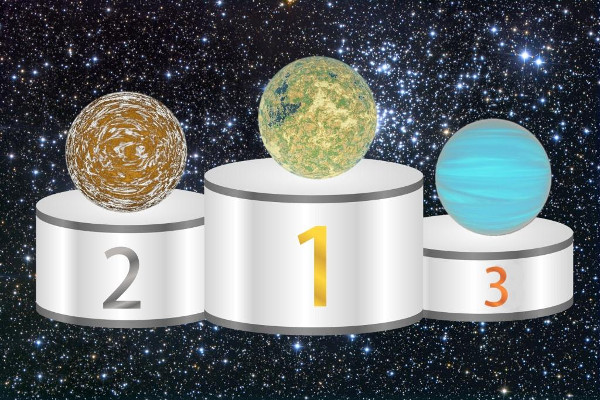Index system to search for life outside the Earth
Astronomers have developed an index system of elements of a planet, helping to assess and classify the potential of life there.
The coefficient helps find extraterrestrial life
Finding saltwater on the surface of Mars is a major finding, changing the prospect of finding life on the red planet. It also tells about the state of the water here, the factor that people need to learn the most if they want to migrate to another planet, according to Science Alert.
With the newly announced index system, not only Mars, people will know which priority to search for life on any planet in the universe, saving a lot of time and money.
"Basically, we invented a way to use all the observed data to develop a priority system , " said astronomy professor Rory Barnes, now working in a virtual planetary laboratory. , University of Washington, said.

Rank planets on the criteria of life ability.(Photo: Science Alert).
"In the future, if we are able to study hundreds of planets, this technology will help show where the first priority is needed".
Scientists now rely primarily on the " livable region " (the Goldilocks region) of a star to determine whether the planet orbits that star at moderate distances so that atmospheric pressure can hold water. on the surface of the planet or not - means a high potential for life. The new index system will help scientists delve into the elements of life within that region.
"This step will help us beyond the concept of a two-dimensional life zone, creating a flexible system, including observable properties, and factors that affect life on one planet, " co-author Victoria Meadows said.
The index system will measure the hardness of a planet's surface and "off-center reflex reduction" , showing the ability to reflect the light that the planet receives from the star as well as the energy it receives. According to scientists, when a planet has a certain balance between this received and lost energy, it will have the right conditions for developmental life.
Planet candidates have a bright life for future space exploration, needing to retain the energy equivalent to 60 to 90 percent of the radiation that the Earth receives from the Sun, studying only out.
"The index system is a big step, but it is no different or contradictory to the Goldilocks region," Barne said. The study was published in the October issue of Astrophysics.
- Attractive lens helps to search for alien life
- Life has spread throughout the solar system
- NASA wants to turn the Sun into a love glass to search for aliens
- What opportunities for humans when they cannot live on Earth?
- Our solar system in the galaxy is rare
- In the end, the Sun would die if the Sun was smaller than Earth
- Cosmic meteorite originated from ... Earth
- Discover more than 700 planets outside the solar system
- Survive extraterrestrial life?
- Unbelievable things are happening on Earth every 5 seconds
- The discovery of 'super-Earth' can bring life near the solar system
- Stephen Hawking: 'Humanity has 1000 years to escape Earth'
 Van Allen's belt and evidence that the Apollo 11 mission to the Moon was myth
Van Allen's belt and evidence that the Apollo 11 mission to the Moon was myth The levels of civilization in the universe (Kardashev scale)
The levels of civilization in the universe (Kardashev scale) Today Mars, the sun and the Earth are aligned
Today Mars, the sun and the Earth are aligned The Amazon owner announced a secret plan to build a space base for thousands of people
The Amazon owner announced a secret plan to build a space base for thousands of people